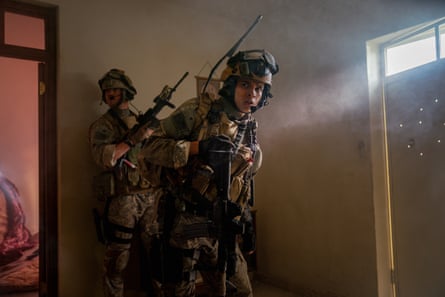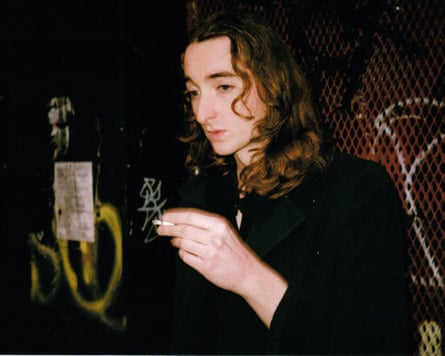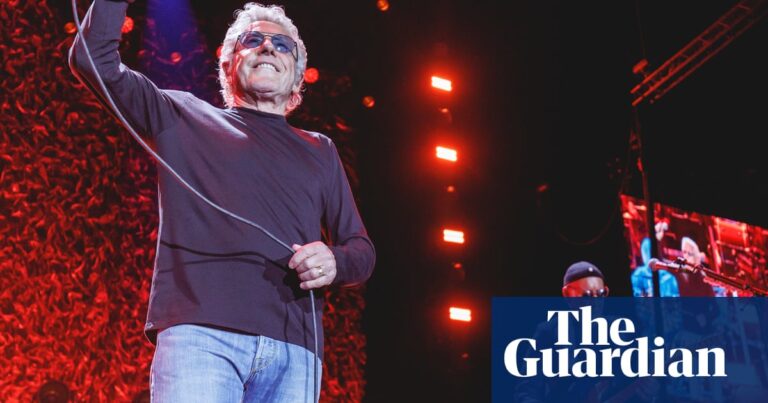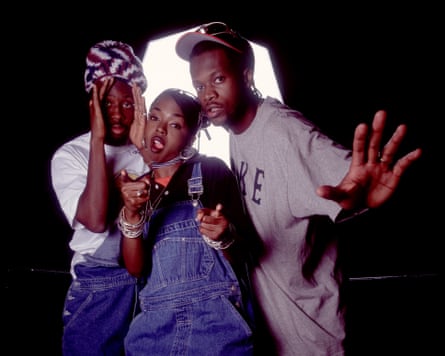Ray Mendoza, 45, served for more than 16 years as a US Navy Seal and training instructor before leaving to work as a Hollywood military adviser, specialising in choreographing gunfight sequences for movies including Alex Garland’s Civil War (2024). It’s with Garland that he’s now co-written and co-directed the film Warfare, a claustrophobically immersive account of an ill-fated surveillance mission that he survived in Ramadi province, Iraq, in 2006. Two men, among them Mendoza’s best friend, sniper and medic Elliott Miller, were badly injured by al-Qaida insurgents, and the attack intensified as the Seals sought to evacuate their wounded. The film, described in the New Yorker as “a work of hyper-exacting realism”, opens in the UK on 18 April.
How do you feel about war films in general?
I feel not seen. It’s actually embarrassing to watch them – they don’t get our culture right, we don’t speak that way. People have asked, are you worried that Warfare may trigger veterans and active-duty military? I think it does the opposite. It’s saying, you’re not forgotten, you are seen. Oftentimes, what is more triggering is seeing what we go through not accurately represented.
Did you have any concerns about telling a story rooted in personal trauma?
I knew I had to be responsible. The biggest fear was always somebody getting hold of it and changing it through creative licence or because it doesn’t fit into the traditional Hollywood grammar of moviemaking, but I had no reservations once I got to know Alex.
The two of you agreed that you wouldn’t embellish or dramatise the story. How did that work?
We interviewed as many of the guys as we could and took a detective-like approach to slotting everyone’s memories together. Forensic is a word we’ve been using a lot. We wanted to make a really honest film, so if it didn’t exist in someone’s memory, it did not go into the story. Memories were our bumpers.
This all happened almost 20 years ago. Did you and the others talk about it much at the time?
No. We each had our own perspective, but we didn’t take the time to slot them all together because we were operating again two days later.
Has making Warfare been therapeutic?
Writing with Alex was more like going to a therapist every day than going to a writing session. Obviously he’s a great writer but he’s also a great listener. Diving into the details and the more emotional components, some of the questions he’s asked me have been far more intelligent than [those asked by] some therapists I have spoken to. It’s comforting because you feel heard and you feel understood.
Were there any difficult moments during filming?
Having my director hat on allowed me to detach myself emotionally most of the time but there was one particular take of the scene where the IED goes off and D’Pharaoh [D’Pharaoh Woon-A-Tai, who plays Mendoza] starts to drag Cosmo [Cosmo Jarvis, playing Miller] up the driveway. Elliott was there with me on set. The light was right, the smoke was right, the energy was right, and it struck a chord – a lot of emotions that were down there started to manifest themselves. I had to call cut. I walked off set, I cried, then I came back and Alex had to take the reins for the rest of the day.

The actor playing you cries. Was it important to show that?
Yes, because it happened. I think I’d have had a reaction no matter who it was, but being that it was my best friend, it stopped me in my tracks. I thought he was dead, I didn’t want to believe it was him, but I quickly snapped back into reality.
The film’s soundscape is very powerful. When it’s loud, it’s explosively loud, but there are also some incredibly tense moments of stillness.
I wanted to bring out this heightened sense. Even when there’s nothing happening, you know something is about to happen, so you’re on the defence. You can hear your hand scratching your hair or a pen on paper, so although it’s quiet, it’s loud.
I hear you put the cast through a three-week boot camp before filming started.
I gave Will [Will Poulter, who plays the officer in charge of the operation] a lot of autonomy and ownership, and I said, these are your guys, they’re not mine. Cherish the ride because you’re going to experience something that most actors do not get to experience. The goal was to put them in positions where they rely on each other, then I injected stressors – gave them tasks that I knew they couldn’t complete, gave them time lines I knew they couldn’t make. It was very kinetic, very fast-paced, with long days and no time to go back to the trailers.
Was the food superior on set?
Fridays were good – there’d be something fun like an ice-cream truck.
It’s been argued that war films inevitably wind up glorifying conflict. How does Warfare feed into that debate?
It isn’t meant to fit into some political box. There’s not a lot of narrative for a reason: it’s for you to fill in the blanks. There’s no score for a reason: adding music, I can lead you to believe what I want you to believe or I can make you feel what I want you to feel – sad, angry, and so on. But if you watch this and say I think war is a good thing, then you should reassess how you view things.
Were you ever afraid as a Seal?
No. If somebody is drafted, and they get thrown into combat, typically the outcome is not optimal, but it was what I signed up to do, so I’d been mentally prepared. It doesn’t mean I’m not impervious to trauma, it just means it’s less of a shock.
Did you write at all while serving?
No, I was way too busy. In this cool, cryptic way, a lot of what I’ve seen that has stuck with me is in things like firefights that I’ve choreographed for movies, commercials, video games … they’re kind of like a living journal that only I know about.
Could you ever have imagined you’d wind up in Hollywood?
No, but it’s very similar structurally, in that you have multiple departments working together to achieve something. There was a lot of concern about our shooting schedule for Warfare but we did it. When everybody was on the same page, we were extremely efficient, and I now use this as a template for how much we can film.
What’s next for you as a writer?
There are a few things I’m developing, about what happens after warfare.
-
Warfare in is UK and Irish cinemas from 18 April
Source: theguardian.com





















